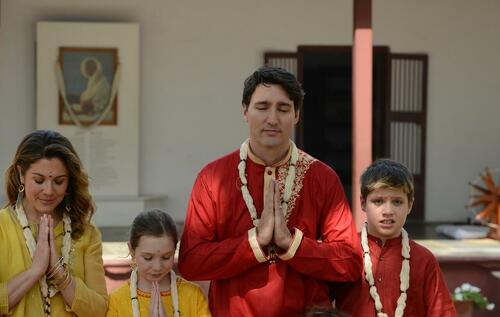
- Industry limit to be implemented through cap-and-trade system
- Canada to start collecting data in 2026, enforcement in 2030
Prime Minister Justin Trudeau’s government will require Canada’s oil and gas industry to cut emissions by 35% from 2019 levels, inflaming tensions with the country’s western provinces.
The plan will be implemented through a cap-and-trade system that sets a legal limit on the sector’s emissions and then lets companies buy and sell a limited number of emissions allowances, Environment Minister Steven Guilbeault announced on Monday.
Companies that reduce emissions will be able to sell more allowances, rewarding those who innovate to cut pollution. The government will begin enforcing the cap in 2030 and gradually lower it until Canada’s economy reaches net zero in 2050.
“We are asking the oil and gas sector to invest their record profits into pollution-cutting projects, projects that can create and keep good jobs,” Guilbeault said at a news conference.
The minister released draft regulations on Monday after presenting an early framework last year. Guilbeault said the government will continue to consult on the final regulations before they’re published next year.

Producers will be allowed to buy carbon offsets or contribute to a decarbonization fund to cover as much as 20% of their emissions at each facility they operate.
Large operators will be required to register and report their emissions starting in 2026. The government will analyze the data and set the eventual cap for 27% below 2026 levels, which it estimates will be roughly equivalent to 35% below 2019 levels. Reporting for small operators will start in 2029. The first compliance period will run from 2030 to 2032.
All operators will be required to register and report their emissions, but only large operators producing the equivalent of more than 365,000 barrels a year will have to remit allowances to cover their emissions. These operators account for about 99% of the upstream sector’s emissions, the government said.
Alberta Premier Danielle Smith, whose province is the home of Canada’s oil sands, said her government was exploring every legal option to challenge the cap — which she says will significantly curtail production.
“We will not stand idly by while the federal government sacrifices our prosperity, our constitution and our quality of life for its extreme agenda,” she said in a joint statement with her energy and environment ministers.
The Canadian Association of Petroleum Producers said the cap will add an “unnecessarily complex layer on top of an already overly complex web of energy and climate regulations.”
“The introduction of this draft regulation comes with the high probability of negative impacts on the Canadian economy and no guarantee of emissions reductions,” Lisa Baiton, president of CAPP, said in a statement.
Read More: Trudeau Bets $9 Billion on Plan to Clean Up World’s Dirtiest Oil
TC Energy Corp. Chief Executive Officer Francois Poirier said the measure would act as a cap on Canadian natural gas production, harming “Canadian families and businesses by raising prices on energy.”
The Trudeau government has said that the oil and gas sector will continue to expand even with the regulations in place, estimating that production will grow 16% between 2019 and the 2030-2032 compliance period. The industry is the country’s largest source of greenhouse gas emissions.
Canada is the world’s fourth-largest oil producer and the fifth-largest gas producer. The emissions cap is set to apply to a broad range of activities, including oil sands extraction and the small but growing liquefied natural gas sector. Trudeau’s government is looking to speed adoption of carbon capture technology.
The government already mandates a national price on carbon, while offering a public backstop for that price known as a “carbon contract for difference,” as well as investment tax credits. Pathways Alliance, a group of six Canadian oil sands producers, is planning one of the world’s largest carbon capture facilities, but has yet to hammer out a project-specific agreement with the Canadian and Alberta governments.
The shelf life of the emissions cap is in doubt, however, as Canada is due for a federal election by late October 2025. Conservative Leader Pierre Poilievre is ahead by double digits in most polls and has promised to scrap many of Trudeau’s climate policies.
“Trudeau wants to suffocate Canada’s energy industry with an arbitrary emissions cap that will devastate Canada’s already broken economy,” Poilievre’s party said in a statement reacting to the plan’s details.
— With assistance from Robert Tuttle
Energy News Beat
